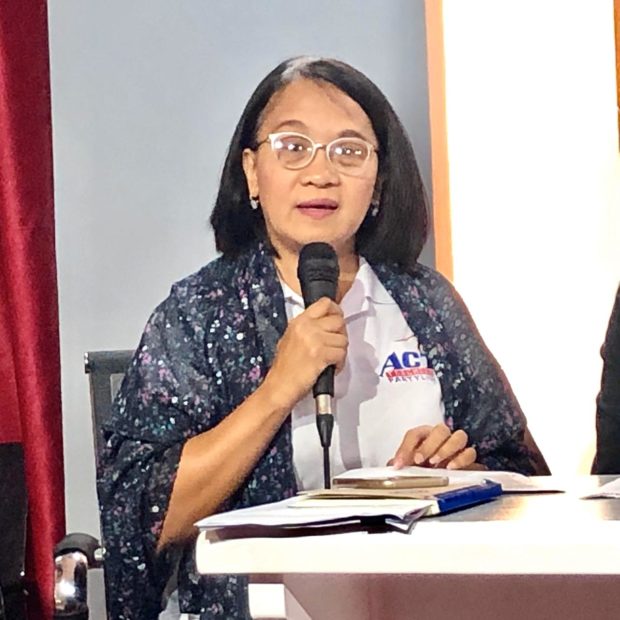
ACT Party-list Rep. France Castro during the weekly press briefing at the House of Representatives on Thursday, Nov 21, 2019. INQUIRER.net file photo / Noy Morcoso
MANILA, Philippines — The Alliance of Concerned Teachers (ACT) Party-list has filed a resolution seeking a congressional probe on the “illegal blocking” of websites owned by progressive groups and alternative media organizations.
According to the group, the move of the National Telecommunications Commission (NTC) to block those websites is a brazen act of red-tagging.
ACT Party-list Rep. France Castro on Tuesday said that House Resolution No. 49 calls on the House committee on human rights and the committee on public information to check the NTC’s decision to restrict access to the websites that allegedly have links to the communists.
“We urge the incoming House Leadership to urgently hear House Resolution 49 and investigate the illegal blocking of websites of progressive organizations, independent media, and international organizations,” Castro said in a statement.
“The memorandum released by the NTC is blatantly red-tagging these progressive organizations, independent media, and foreign-based organizations,” she added.
Castro then enumerated that among the blocked websites of progressive organizations are:
- Save Our Schools Network
- Unyon ng mga Manggagawa sa Agrikultura
- Pamalayakaya Pilipinas
- AMIHAN National Federation of Peasant Women
- Rural Missionaries of the Philippines
- Bulatlat.com
- Arkibong Bayan
- Pinoy Weekly
- International League of People’s Struggles
- Counter Punch
- International Action Center
- Monthly Review
To recall, the NTC ordered on June 22 the blocking of websites supposedly affiliated with and supporting the Communist Party of the Philippines (CPP), its armed wing New People’s Army (NPA), and its political arm National Democratic Front (NDF).
The NTC order stemmed from a request of former National Security Adviser Hermogenes Esperon Jr., who was also an official of the Duterte administration’s National Task Force to End Local Communist Armed Conflict (NTF-Elcac).
READ: NTC has no power to block news websites based on ‘mere allegations,’ says IBP
While several groups have called out the NTC for blocking the website, the past administration’s officials have insisted that they have a basis to do so.
READ: Groups hit by NTC order to block websites may get legal remedies — Palace
But Castro maintained that there is no legal basis for the NTC, National Security Council, and the NTF-ELCAC to block those websites.
“Nothing, whether express or implied, in Executive Order 546, series of 1979 and Republic Act 7925 or the Public Telecommunications Policy Act – the charter and enabling laws for the NTC – empowers it or any other agency to block access to websites, more so without a court order,” Castro said.
READ: Gov’t has basis to block websites tied to terror groups — incoming NICA chief
“There is also nothing in Republic Act 10175 or the Cybercrime Prevention Act and the Anti-Terrorism Act that clothes the ATC or NTC, with such or similar power,” she added.
The administration of former President Rodrigo Duterte launched a crackdown against armed insurgency in the countryside, but it earned criticisms from human rights groups that claim some of those killed were non-combatants.
The anti-insurgency campaign has also gained controversy as state officials under the Duterte administration were accused of red-tagging or linking people and legal organizations to communist rebels.
But prior to this anti-insurgency campaign, Duterte was notably close to the Left, even appointing several activist leaders to his Cabinet in the early part of his term. Peace talks, especially with CPP leader Jose Maria Sison – who happened to be his former professor – were also happening for some time.
Duterte, however, eventually cooled off noting that the time to be friendly with communist rebels – which he did for politics’ sake – had to end as national security comes first.
READ: ‘They are terrorists,‘ Duterte says of communist rebels

